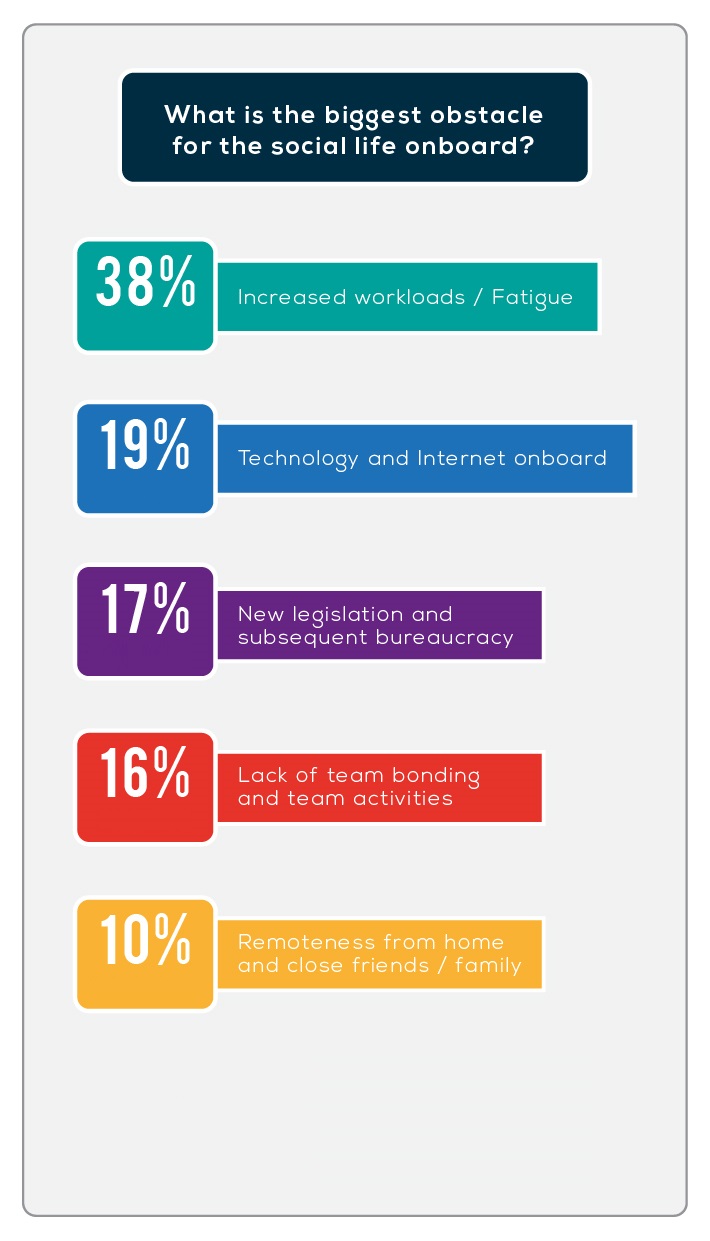15% of deaths at sea are by suicide. The key question to ask when shocking tragedies onboard come to light is this: do they signify social isolation? And, what leads to seafarers’ social isolation?
Seafarers spend months on end at sea, facing some of the toughest conditions of any workforce – isolation, cramped living quarters, noise, heat, storms – sometimes they’re not even able to stomach the food on board.
Sailors’ Society CEO Stuart Rivers, has said.
Recent SAFETY4SEA Poll finds that seafarers want their work to be less stressful. Increased workload and the subsequent fatigue were reported the biggest obstacles for social life onboard gathering 38% of our readers’ votes, surpassing other “barriers” like isolation from family (10%), connectivity (19%); bureaucracy (17%) and team bonding (16%).

The poll’s results conform with “The Seafarer’s Happiness Index Q2 data” which find workloads still high.
Regulations are increasing the work load at sea, rather than easing it. With so much to do, so much documentation and processes to follow, seafarers reported feeling stressed and squeezed by the pressures placed upon them.
– Seafarer’s Happiness Index
Which are the health implications of workload?
- Stress: The ILO MLC,2006 has addressed a lot of stressful factors affecting seafarers’ wellbeing with the common symptoms being:
- Sleep problems
- Sweating
- Loss of appetite
- Difficulty concentrating
- Headaches
- Muscle tension or pain
- Dizziness
- Chest pain and rapid heartbeat
- Frequent colds
- Upset stomach
- Breathlessness
- Dry mouth
- Anxiety
- Moodiness
- Feeling low
- Worrying constantly
- Imagining the worst
- Losing your temper easily
- Drinking/smoking more
- Nail biting
- Safety: Fatigue affects mariner performance resulting in near misses or fatal accidents. Numerous policy and regulatory efforts have been put in place in order to manage fatigue, (i.e. Title 2 of the MLC addressing hours of work and rest).
Unfortunately, reports from some seafarers suggest that these regulations are not always enforced.
Johan Smith, Wellness Project Manager, Sailors’ Society states at SAFETY4SEA Sea Sense Column.
6 more reasons impacting seafarer’s mood and subsequently their social life
- Isolation from family
- Low wages/salary
- Lack of interaction with co-workers
- Limited connectivity
- Length of contract and lack of shore leave
- Quality and quantity of food on board
Where do we go from here?
The above-mentioned data indicate the importance of the welfare of seafarers at sea. The industry needs to find ways of listening when crews speak out about problem issues and things which need to be fixed.
– The Mission to Seafarers Happiness Index exists to provide all men and women working at sea with a chance to share how they feel and to talk about the good and bad about life at sea today. Views can be shared here to help the industry know what works and what needs to be changed.
– ISWAN’s SeafarerHelp is a free, confidential, multilingual helpline for seafarers and their families, available 24 hours a day, 365 days a year. The team is trained in emotional support and suicide risk assessment.
– The Apostleship of the Sea is a Catholic charity supporting seafarers worldwide. The organization provides practical and pastoral care to all seafarers, regardless of nationality, belief or race. Their port chaplains and volunteer ship visitors welcome seafarers offer welfare services and advice, practical help, care and friendship.






























































